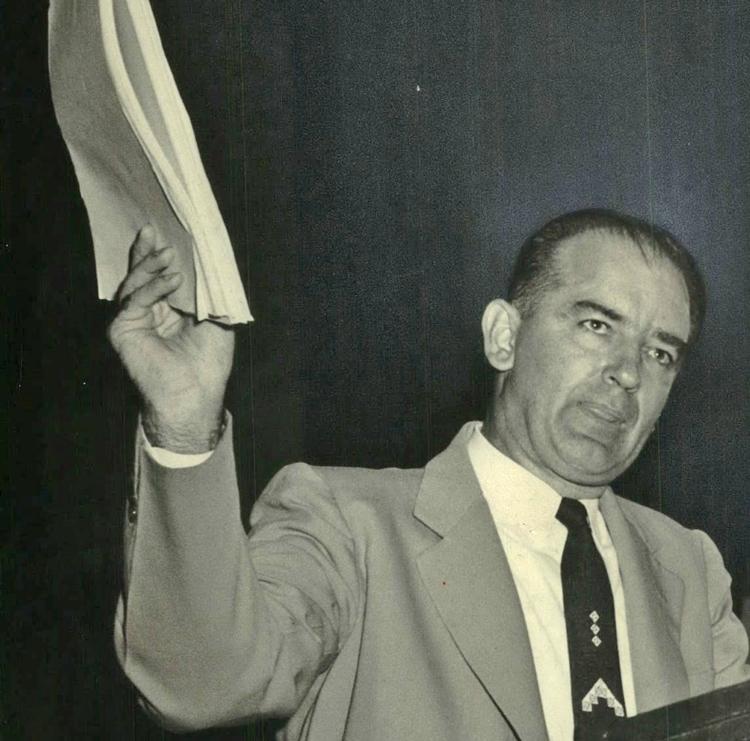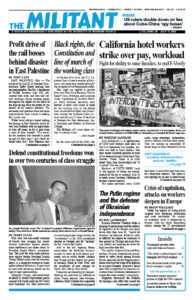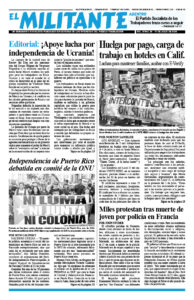
Won over two-and-a-half centuries of bloody class struggle, key constitutional protections against government interference are under attack by President Joseph Biden’s administration. The push for even more prosecutions against former President Donald Trump, Biden’s main rival for the presidency, is a dangerous attempt to criminalize political differences. It goes hand in hand with increasing attacks on the right to legal representation.
Alongside Trump’s indictment handed down by Justice Department special counsel Jack Smith under the 1917 witch hunt Espionage Act, other prosecutors are also trying to pin charges on him for “interference” in the 2020 presidential election in Georgia and for “inciting” the Jan. 6 riot at the Capitol.
Add to the list: ongoing felony prosecutions for falsifying business records to cover up hush-money payments, not an actual felony; charges that Trump and his family are guilty of business fraud in New York; and the possibility of new charges by Smith, this time in New Jersey.
Democrats are hounding his lawyers. Hearings are underway in California to disbar Trump attorney John Eastman. Likewise, Rudy Giuliani was suspended from practicing law in New York without even a hearing, based largely on statements he made outside any court of law, which are fully protected by the First Amendment.
Jenna Ellis, another Trump lawyer, was disciplined by a federal judge for her political opinion that the 2020 election was rigged. However unfounded her claims might be, she has a constitutional right to express them, views that are held by millions, without having her livelihood threatened.
The message to lawyers is clear — represent the man Democrats bitterly hate and you’ll have no legal career.
During the first imperialist World War, lawyers were disbarred for opposing U.S. entry into the war and opposition to conscription. Suspension and disbarment were used in the 1950s against lawyers who dared to represent Communist Party members facing persecution by Sen. Joseph McCarthy and the House Un-American Activities Committee. Their offer of legal representation made them “fellow travelers,” prosecutors argued, just as liberals today label Trump’s lawyers “enablers.”
Similar treatment was meted out to civil rights lawyers in the ’50s, especially in the South.
Smith is also going after Trump’s right, including his right as a presidential candidate, to speak out on the issues in his prosecution. In the unfolding espionage case, prosecutors won a ruling from a federal judge barring Trump from discussing the evidence in the case.
Both Smith in his indictment and Manhattan District Attorney Alvin Bragg, prosecutor in the hush-money case, have submitted charges that are intentionally vague. Bragg explicitly says he doesn’t have to say what they are. Smith leaves open filing additional charges as he goes along. All this makes it increasingly difficult for Trump and his lawyers to prepare a defense, as protected by the Constitution.
Prosecutors are also expected to demand that proceedings with the main evidence against Trump — government documents the FBI snatched in an armed raid on his Mar-a-Lago home — must be kept secret, as prosecution staff blithely leak excerpts to cohorts in the liberal media. That infringement on the right to an open trial — as opposed to a star chamber proceeding — has marked other cases where the government claims “national security” is at risk.
Each of these steps undermines crucial protections under the Sixth Amendment to the Constitution. Looking to be able to cook up more charges, Smith has moved to postpone the trial in Trump’s case. But anyone accused of a crime has the right to a speedy public trial, to be informed of the nature and the cause of the accusation, to be able to confront the witnesses against them and to have legal representation.
The liberal press keeps leaking unsubstantiated claims of a “smoking gun” from nameless “people familiar with the case” to try to prejudice the trial. CNN broadcast snippets it says are from a tape of Trump speaking to four people on July 21, 2021, where he says he has a document that disproves claims by Gen. Mark Milley, chairman of the Joint Chiefs of Staff, that Trump was about to launch a military assault on Iran.
Days later, with much less fanfare, CBS noted that the document is not — at least not yet — part of the evidence in Smith’s indictment.
Defend rights tied to class struggle
Repeatedly defended under the pretext that “no one is above the law,” the drive to criminalize Trump tramples the Constitution underfoot. Because of this, the charges against Trump should be dropped.
Whatever they do to him, the same and worse has been, and will be, turned against working-class fighters, the unions and political groups. Members of the African People’s Socialist Party and Uhuru Movement were subjected to a heavily armed, provocative, FBI raid just days before the FBI raided Mar-a-Lago last year. Both raids violated protections from unreasonable search and seizure. They now face trial under witch hunt “foreign-agent registration” laws.
Using and fighting to extend constitutional freedoms has always been an integral part of every serious struggle by unions, organizations of the exploited and oppressed, and communist groups like the Socialist Workers Party. Wherever working people fight to wrest social and economic concessions from the bosses, organize opposition to the U.S. rulers’ wars or set out to build our own independent working-class political party, we’ve needed these liberties.
“From the day the Constitution was ratified on June 21, 1788, there were struggles by small farmers, craftsmen, mechanics and other plebian layers, former slaves and bonded laborers, and later the rapidly expanding hereditary proletariat and other exploited producers to protect their interests within this new governmental structure,” explain Jack Barnes, Mary-Alice Waters and Steve Clark in The Low Point of Labor Resistance Is Behind Us: The Socialist Workers Party Looks Forward.
“Through hard-fought struggles they won amendments — changes — to the Constitution that provide protections from the state and exploiting class on whose behalf it rules.”
The Second American Revolution that overthrew chattel slavery and the ensuing rise of Radical Reconstruction led to the expansion of constitutional freedoms with the passage of the 13th, 14th and 15th Amendments. These additions to the Constitution in the interests of African Americans and working people as a whole immediately came under attack. By the 1880s Radical Reconstruction was overthrown and the capitalist rulers imposed Jim Crow terror and segregation, inflicting the worst defeat ever suffered by the U.S. working class.
It took the mass Black-led working-class movement that uprooted Jim Crow in the 1950s and ’60s to win court rulings and legislation that defended the rights of Blacks and then women, often under the 14th Amendment’s “due process” and “equal protection” clauses.
The history of the working-class movement is deeply tied up with the fight for these basic liberties. So too, is its future.

